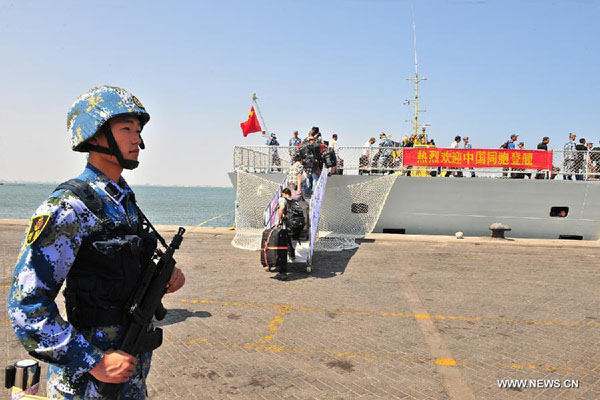
In the chaotic web of alliances in Yemen’s new conflict, China’s relatively meek intervention might be overlooked. But it’s a noteworthy sign of China’s growing geopolitical power, which has gained a lot of attention in Sub-Saharan Africa but also extends to the Middle East. And while the evacuation may look like they are cutting their losses, it may actually serve an important strategic purpose to extend China’s reach.
China’s interest in Yemen goes back decades, with Beijing helping with infrastructure developments in Yemen as far back as the 1950s. In recent years, however, the relationship clearly deepened: In 2013, President Xi Jinping welcomed President Abed Rabbo Mansour Hadi to Beijing on an official visit and the two nations even vowed military cooperation. Beijing announced a $507 million loan to help develop the port of Aden that year, though some local media reports said that the loan had been suspended this year before it was due to commence.
For China, the logic behind the relationship was clear. Firstly, Yemen oil production could provide energy for China’s booming economy, and China has spent over a decade investing heavily in Yemen’s oil industry. Just as important, however, was Yemen’s geographical location. Not only was Yemen close to the Horn of Africa, where China has a substantial economic footprint, its location by the Gulf of Aden made it a strategic location for the Suez Canal: In fact, the ships that rescued the Chinese nationals this week were part of an international anti-piracy operation in the region that China had been a part of since 2008.
Ever since Yemen fell into chaos in early 2015 and Hadi was forced out, Beijing has kept its economic interests going in Yemen. Oil shipments continued flowing from the country – Reuters reports that oil shipments in the first two months of 2015 were up 315 percent up from the same period in 2014. The Chinese government showed a pragmatic side, with recent reports that they met with the Houthi rebels who took over the capital of Sanaa earlier this year to discuss economic partnership.
The pragmatism extends to the mass evacuation of almost all the Chinese citizens in Yemen. As Jane Perlez of the New York Times notes, the swift work of China’s navy would play well with an audience at home – serving as a reassurance that Chinese nationals would be protected all around the world – and China’s ambassador to Yemen has vowed to keep its embassy in Sanaa and consulate in Aden open.
In an opinion article published by the state-run Xinhua, writer Wang Bowen said that the swift evacuation demonstrated the “responsibility” and “humanism” of the Chinese government. Mass evacuations of nationals from dangerous situations has become expected for Chinese working abroad: In 2011, China dispatched a number of ships to evacuate around 35,000 citizens from Libya as a civil war spread across that country – and, as Wang notes, 2,100 citizens from other countries were also helped to escape (an Egyptian and a Romanian were also evacuated by Chinese ships this week).
While China may be making high-profile moves to keep its options open in Yemen, other nations are doing similar low-key work. V.K. Singh, India’s minister for external affairs, was sent to Djibouti on Tuesday to supervise a lower-key evacuation of Indian nationals from Yemen. And Russia, which has had a limited relationship with Yemen since the end of the Soviet Union, has also been in economic talks with the Houthis.
Washington Post

Leave a Reply
You must be logged in to post a comment.